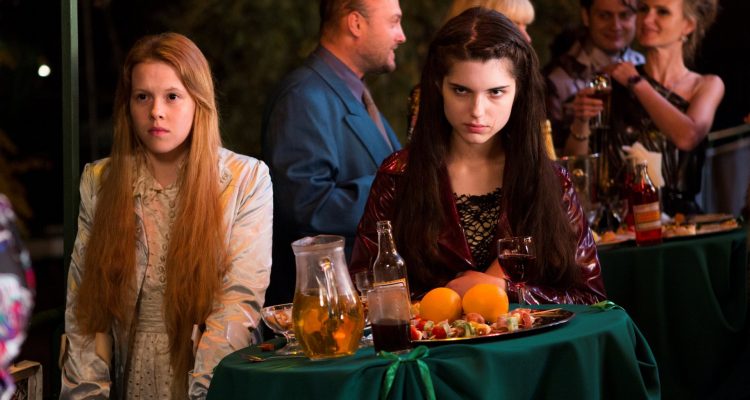This is a reprint of our review from the 2016 Sundance Film Festival.
In mermaid tales — the old ones, before Disney — hybrid fish-women use their glorious voices to lure men into the depths. In some regions, mermaids are harbingers of doom; in others, they are vengeful spirits of women who were themselves lured to the water by treacherous, violent men.
The Polish cannibal mermaid musical “The Lure” cherry-picks from various traditions to create its own unique folkloric creatures in a darkly freaky riff on Hans Christian Andersen‘s “The Little Mermaid.”

As a family of musicians sings on a beach at night, a mermaid just off shore falls in love with the 20-something son. With acoustic guitar, gilded pipes and glowing curls, this penniless prince captivates Silver (Marta Mazurek), a mermaid drawn by his song. She and her sister Golden (Michalina Olszańska), their heads bobbing just above water, plead for a helping hand: “Help us come ashore, nothing to fear, we won’t eat you my dear.”
Soon, Silver and Golden are nude in the back room of a local club, long tresses not quite covering their bodies, two men eagerly ogling the smooth surfaces where human genitals would be. When exposed to water, their legs transform to long, fishy-serpentine tails. The mermaids smile proudly, but they haven’t yet shown their dire teeth.
 In adapting and contorting “The Little Mermaid” to fit the milieu of 1980s Warsaw, “The Lure” uses the open and manipulative sexuality of the nightclub scene to create the illusion of acceptance for Silver and Golden. The environment is seedy and emotionally dangerous, all too clearly a haven for the lost and broken. The setting is persuasive in its superficial depiction of period details, and, more deeply, an exceptional evocation of the odd.
In adapting and contorting “The Little Mermaid” to fit the milieu of 1980s Warsaw, “The Lure” uses the open and manipulative sexuality of the nightclub scene to create the illusion of acceptance for Silver and Golden. The environment is seedy and emotionally dangerous, all too clearly a haven for the lost and broken. The setting is persuasive in its superficial depiction of period details, and, more deeply, an exceptional evocation of the odd.
The club’s patrons love the semi-nude mermaids as they sing from a giant bowl, but for those more personally connected to the duo, lust and disgust are often closely intertwined. Mietek (Jakub Gierszal), the boy to whom Silver is so eager to hand her heart, is far more difficult to distract than a typical punter. “To me you’ll always be a fish,” he said. “An animal, that is.” Before too long, “The Lure” dives into queasy body horror, and the musical number that reveals just how far Silver is willing to go to find a place with her landed lover is brutally frank.

First-time director Agnieszka Smoczyńska has a knack for the flashy, trashy nightclub numbers that provide the film’s rhythm and meter, and which dance from a cover of Donna Summer‘s “I Feel Love” through charming romantic duets, a dark electro jam into a scuzzy rock song by a band that counts another landed aquatic monster amongst its members.
The songs are more like repetitive pop tunes than lyrically ambitious musical puzzles, but they’re catchy, and perfect for this dreamy approach to a fable in which intersecting glances become car-crash wrecks of desires and betrayals containing the film’s most significant meanings. The lyrics mostly back up the core of each scene, or confirm that bad vibes are indeed shimmying down the line. “I know now that love is vicious,” warns one number.

Smoczyńska crafts the story with a child-like sense of wonder and distance, but allows the film’s innocence to be bruised by thoughtless acts and the experience of a dawning maturity. The images and montage don’t always make perfectly clear sense, but the seductive power of the songs and images is enough to allay any great confusion. Like the nightclub setting, “The Lure” can be a delirious whirl, a thing to get swept up into rather than one to dissect.
Indeed, even when notes of horror dominate, they’re most effective as amplifications of the underlying emotional horror. The visually grand horrific flourishes are in service of explorations of smaller, more common fears: the idea that a freely given love cannot counteract callousness, or that sacrifice can seem completely fruitless, especially when made to court love.
 As Silver and Golden, Mazurek and Olszańska are well-cast, creating a bewitching pair with their own hidden history and tensions. They appear to be completely at ease whether in the midst of hundreds of choreographed extras or grinding though a wickedly awkward home life with the pure grace you’d expect to see a mermaid display in the water.
As Silver and Golden, Mazurek and Olszańska are well-cast, creating a bewitching pair with their own hidden history and tensions. They appear to be completely at ease whether in the midst of hundreds of choreographed extras or grinding though a wickedly awkward home life with the pure grace you’d expect to see a mermaid display in the water.
Crafted as a kaleidoscope of color and nightclub sparkle, “The Lure”‘s glitter does not distract from the fact that this is a technically confident and often quite accomplished piece of filmmaking, with a rare ability to dance intuitively between linear plotting and phantasmagoric fantasy. Sundance placed the film as part of the World Drama lineup rather than the more overtly strange Midnight program, and we’re hoping that means the festival has as much faith in Smoczyńska’s future as a director as we do. [B+]

